Many believed that online learning would leave learners feeling isolated, confused, or unsure that their education would look good on their CV, or provide the education required to succeed in their current or future job. Something that was reflected in the attitude of traditional universities, as among nearly 3,000 colleges in the United States, only 10% had plans to offer their instruction completely online for Fall 2020, with the remaining 34% of institutions intending to run classes primarily online, 21% in hybrid format, 23% primarily in person, and 4% fully in-person.
How wrong they were. According to Guide2Research, online education received worldwide attention in March 2020, as schools were forced to suspend face-to-face classes due to the COVID-19 pandemic. Based on UNESCO data published in 2020, the health crisis shut more than 1.7 billion students out of the classroom. As a result, universities had to quickly move online as the online learning industry is projected to pass $370 billion by 2026.
However, some universities, like Nexford, were way ahead of the game. Those that started online didn’t have to rapidly adjust their syllabus and methods of learning to take advantage of the new norm.
Ignore online learning at your peril!
Online education is here to stay. Here are the top 10 online education trends to be aware of in 2021 and beyond.
Learn how to develop the most in-demand skills for your future career!
Discover how you can acquire the most in-demand skills with our free report, and open the doors to a successful career.
1. Higher education institutions will continue to expand their online learning programs
Guide2Research predicts that as the relevance of online education continues post-pandemic, and the interest and number of enrollees go up to a steady climb, higher education institutions will also expand their online program offerings as a strategic response to the current demand.
Some leaners may elect to go with full blown degree programs and as job specs and market forces continue to evolve, they may also choose to specialize their BBA, MBA and MS in areas such as Artificial Intelligence, Digital Transformation, Data Analytics, E-Commerce, Cybersecurity and International Business.
Those who just want to add skills to their career toolkit may choose 100% online certificates to meet their career goals and put them on the path to completing a full degree program. On the other hand, those who want to master a specific skill may choose a single online course.
Higher education institutions will have to adapt their syllabus to answer this demand, or risk losing learners to those who can.
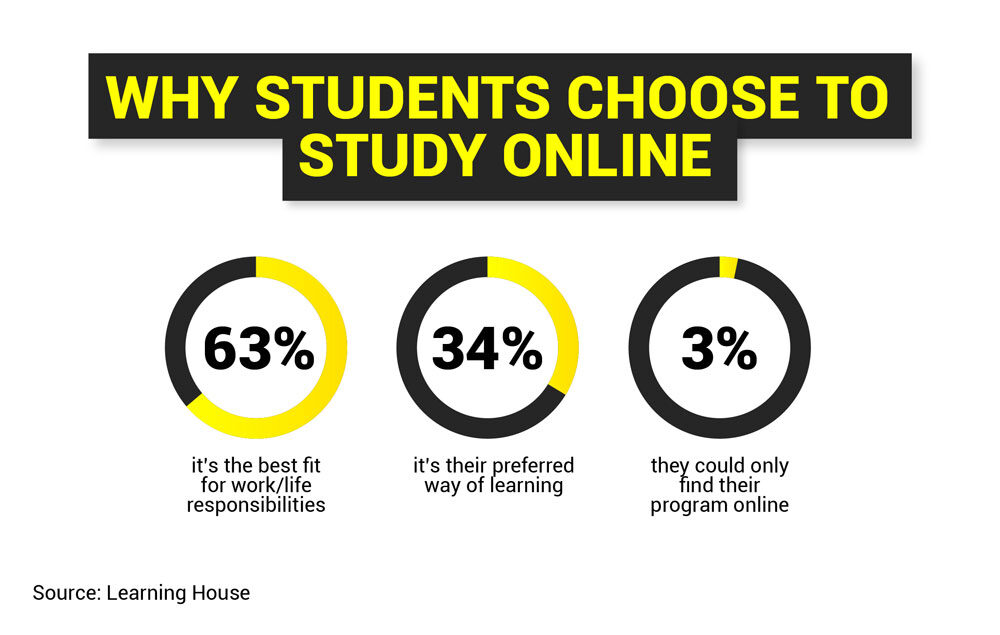
2. MOOCs will partner with educational institutions to focus on micro-credentials
When schools were forced to close because of the pandemic, there was a sudden surge of online traffic to MOOCs according to Class Central, a website that keeps track of the online learning segment. Coursera, for example, closed over 10 million enrollments in 30 days—a 644% increase compared to their 2019 figures. But more than being a marketplace for free or low-cost online programs that can supplement one’s course work in a university, MOOCs can also provide more value to the learner through stackable micro-credentials.
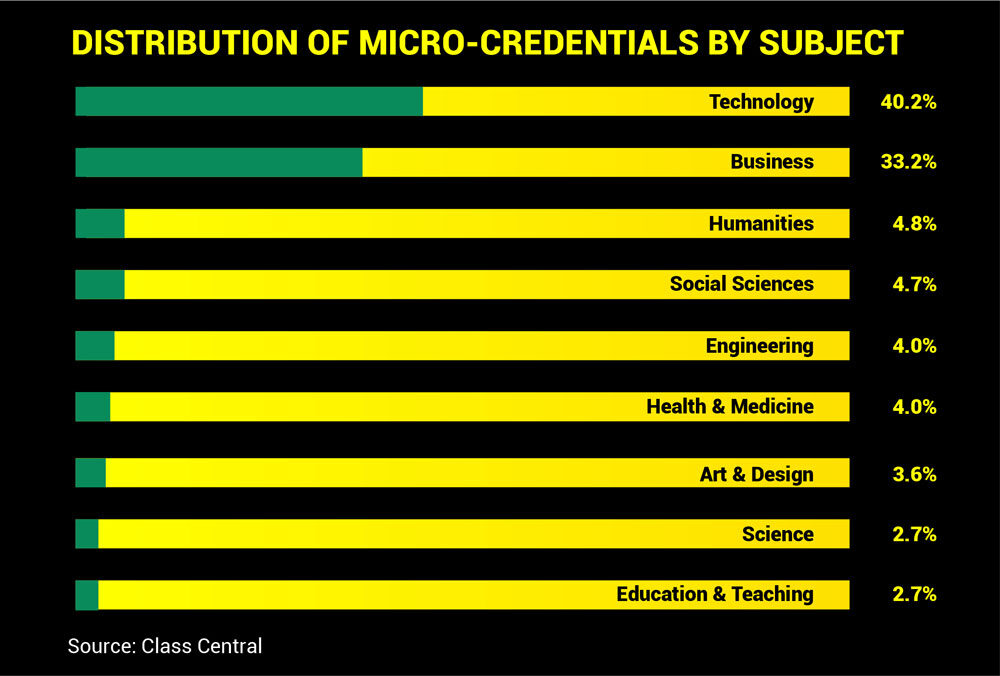
3. Learners empowered through mobile learning and microlearning
Modern learners are overwhelmed and distracted, but fortunately, they are also motivated to learn. They adopt a “self-serve” learning approach where they can be empowered to take learning into their own hands (Greany, 2018). Over 60% of learners also prefer personalized, timely content and more than 56% learn on-demand. This is where we believe mobile learning’s portability and accessibility can truly match the needs and lifestyle of modern learners and why it will continue to be one of the most popular delivery methods for e-learning.
An important aspect of mobile learning is microlearning, which delivers content in small bursts. However, microlearning is more than just being small. Microlearning education is comprised of small or short courses or relatively narrow learning units or subjects.
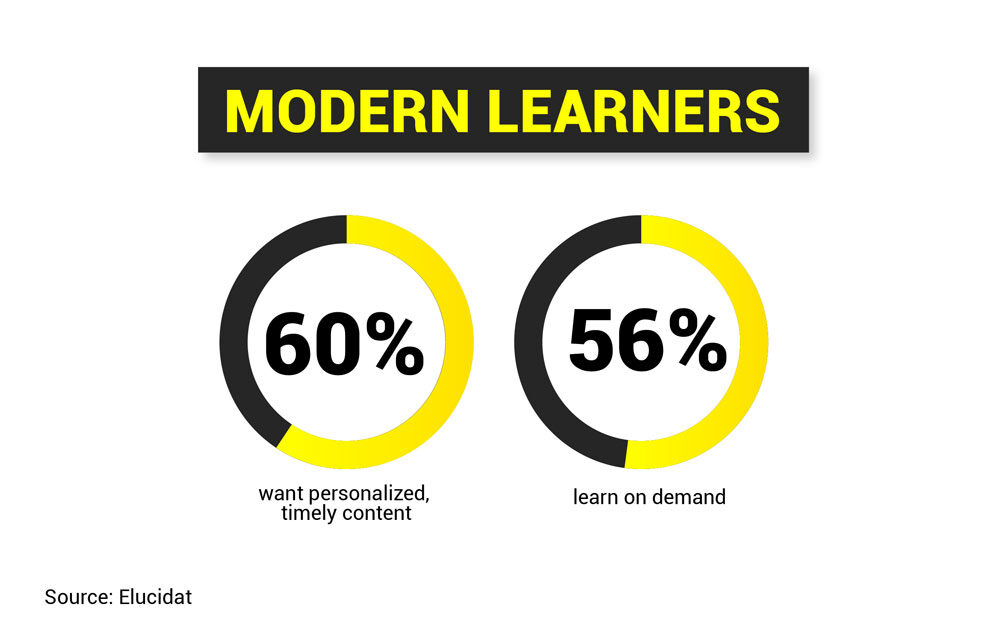
4. AI provides personalized learning pathways
AI’s practical application has been seen in other industries, like manufacturing and healthcare. In education, its growth is estimated to reach $6 billion by 2024 (Bhutani & Wadhwani, 2019) with China and the US leading global AI education investments (Lexalytics, 2019).
AI has started to appear in many colleges and universities to drive enrollment or to streamline operations. One area where AI and machine learning will be felt the most is on personalized learning. Auto recommendation systems, for instance, will interact with a student based on their behavior, profile, and performance.
Personalized online learning is helping address issues such as motivation, dropout rates, and distractions. It can be utilized to personalize admissions, implement proactive student retention, and learners are already accustomed to highly personal interactions with artificial intelligence (AI) such as Siri, Facebook, and Google. This market is expected to grow by over $250 million by 2025.
The system can track a student’s mastery of a topic or skill through testing, and recommend other resources like videos, games, or simulations matched to their learning requirements.
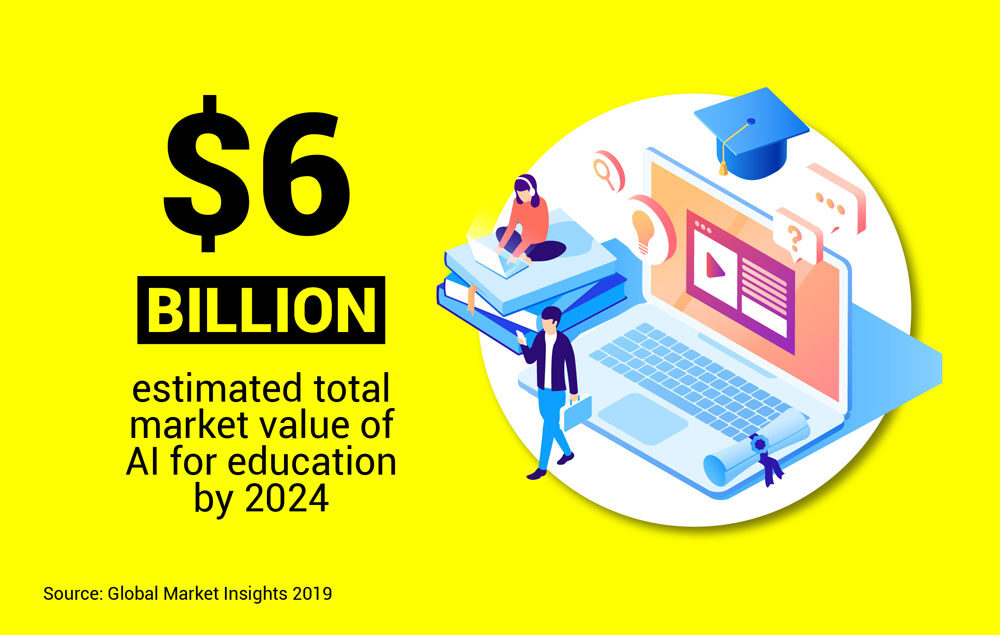
6. Video based learning will maximize the impact of mobile learning
Video is a versatile medium for delivering mobile learning, and learners seem to favor it among other social media platforms. In a study by Pearson, 67% of millennials, and 82% of GenZ reported YouTube as their preferred learning platform. With the availability of affordable and innovative video technology, more organizations will leverage video’s capabilities either as a stand-alone learning material or as a supplement to their face-to-face, instructor-led sessions.
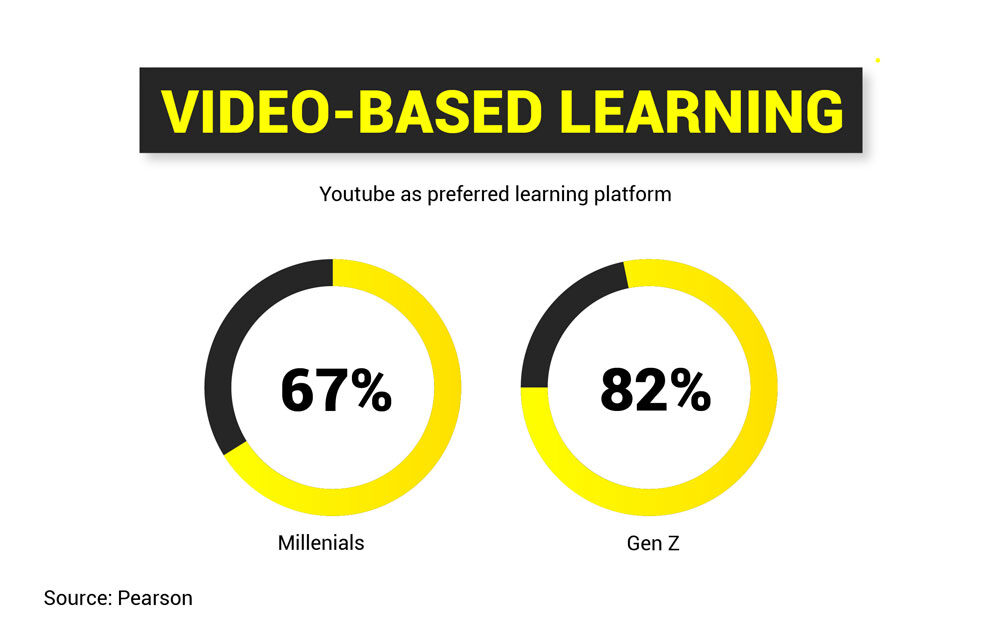
7. 5G stimulates immersive learning experiences
Augmented and virtual reality are game changers in education in capturing and keeping the attention of students. Statistics from a National Survey show that 90% of educators agree that VR technology is quite an effective way of providing differentiated and personalized learning experiences for students.
The downside to these experiences is the speed of internet needed for them to be implemented on a widespread basis.
South Korea, China, and the United States have led developments in 5G technology. Though we have yet to see the technology’s full deployment in 2021, we can expect that once the infrastructure is set, it will impact online education, particularly immersive learning experiences, such as VR, AR, and MR. In fact, lab and fieldwork in higher education is contributing to the rapid growth of these advanced technologies. Integrating 5G into learning systems offers vast opportunities, including education and immersive video services as well as case studies and innovative research collaboration (Ahmad, 2020).
8. Open Educational Resource continues to gain widespread adoption
College students spent about $1,290 on books and supplies during the academic year of 2018-2019 (CollegeBoard, 2019). As the cost of higher education and textbooks for students becomes increasingly expensive, we can expect Open Educational Resource (OER) to continue to gain widespread adoption. Already, US educators have expressed an increasing preference for digital learning materials over printed content, and their students also have the same growing acceptance (Seaman & Seaman, 2019).
9. Gamification and serious games
Games are deeply embedded in modern culture. So, it’s not surprising that educational institutions will use them in the learning process. Gamification and serious games are showing some promising benefits.
Colleges and universities are using gamification strategies like badges and leader boards to encourage student participation in school activities, motivate them to explore learning outside of the classroom, and help increase their social engagement with peers. Other universities have also used gamification to teach soft skills and to help students form a habit of lifelong learning. These efforts have shown to not only improve student motivation and success but also increase student retention for the schools (Schwartz, 2019).
10. Technology-powered tools become the future of assessment
Technology-powered assessment tools are set to become the future of assessment. These tools can provide immediate feedback, increase efficiency, and reduce teacher’s workloads, and integrate formative and summative assessments, among others.
We can also expect the rise of intelligent systems backed by AI and machine learning to perform continuous, unobtrusive testing, and deliver instruction based on what students are ready to learn (Ferrara, 2019). This means a more individualized student assessment that can be more meaningful and empowering for the learner.
Online college options are going to continue to increase in popularity as costs get lower (thanks to better technology) and quality of instruction continues to evolve and improve. Within the next generation, online learning will become more of a norm and less of a novelty.
Learn how to develop the most in-demand skills for your future career!
Discover how you can acquire the most in-demand skills with our free report, and open the doors to a successful career.
With Nexford, online is truly where it’s @
As a modern and progressive online university, Nexford is always looking for ways to modernize its teaching methods to stay in tune with evolving learner demands and remain relevant in the global higher learning landscape. A springboard to make this all happen came in the form of a recent $10.8M pre-Series A funding that will help Nexford to scale its remote learning platform and increase levels of automation and technological advancement.
Nexford designs students’ curriculum based on analysis of employer needs. It always follows the Big Data approach, asking the question, “How do we find out what employers worldwide are looking for, and keep our curriculum live and relevant?”
Nexford continuously seeks to analyze skills more accurately and automate more functions to enhance the user experience. By staying ahead of the technology curve, the future looks bright for online learning and by constantly keeping pace, for Nexford University as well.
Ready to take the next step? Learn more about our 100% online, affordable, and high-quality Programs and Specializations.
Subscribe to our newsletter
Don't miss out on our latest updates.
Unlock Your Potential: Explore Our Programs
Invest in yourself and your future. Discover our range of degrees, courses, and certificates to achieve your goal





-3.png)

